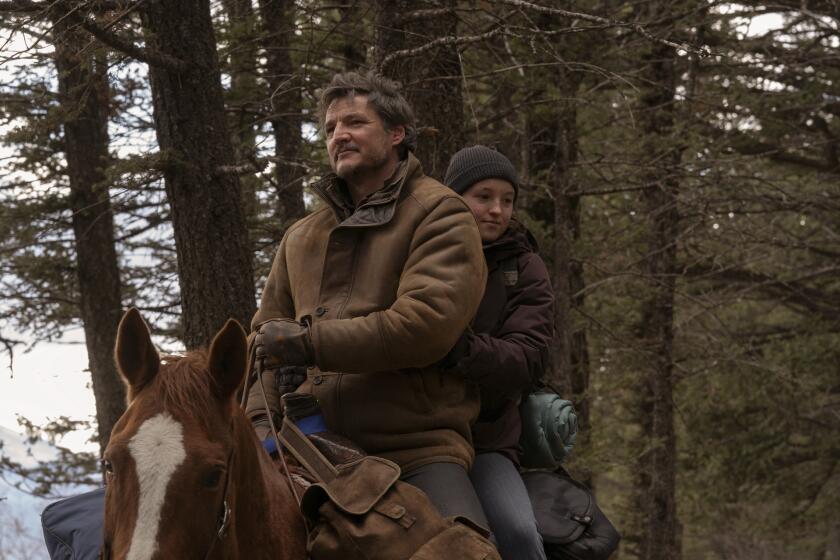Perspective: L.A. Phil’s Shostakovich concert rings hollow
- Share via
Russians told this joke during Stalin’s reign of terror: “Comrades, who was better leader, Premiere Stalin or Pres-ee-dent Hoover?” “Hoover, Hoover taught Americanski not to drink!” “But comrades!” spouted another, “Stalin taught Russian worker not to eat!” Russian classical composer Dmitri Shostakovich (1906-75), whose magnificent music was banned by Josef Stalin, may not have found the joke amusing.
The Los Angeles Philharmonic recently performed the world premiere of the prologue to Shostakovich’s “lost” opera “Orango,” a pro-Socialist lampoon of an ugly, greedy, half-man, half-ape capitalist. Because I booed the production, I was challenged to a fistfight by an Occupy Wall Street supporter.
A little background first.
Shostakovich belonged to the pro-revolutionary Russian intelligentsia. These progressives objected to the exploitation of workers and cheered 1917’s Great Leap to Socialism because they believed Russia would be liberated from a millennium of czarist tyranny. Shostakovich and others grew disenchanted when the Great Leap tumbled into a cult that seized their wealth and stifled their freedom.
Shostakovich might well have supported some of the Occupy Wall Street movement’s demands, as do I, for the reform of rules governing big business and big government.
I do not believe Shostakovich would have approved, as I did not, the crass and juvenile juxtaposition of propagandist photographs the orchestra displayed during the Prelude’s performance. These were part of the staging by Peter Sellars, who’s famous for giving classical works a contemporary spin. The montage depicted beleaguered Occupy Wall Street protesters, riot police, grainy head shots of U.S. military officers, a U.S. carrier launching aircraft, U.S. war planes flying in formation, a drone, demonstrators in Egypt’s Tahrir Square, streets lined by vacant houses affixed with foreclosure notices and a hauntingly sentient lab monkey with a stainless steel ring screwed into its skull.
During his Upbeat Live pre-concert interview, Sellars explained that he wanted to show how people are out in the streets protesting capitalist greed now just as the Russians were out on the streets in the 1920s. The photo of the little brown monkey was meant to convey a link between Orango’s deranged geneticist and today’s Monsanto, whose genetically engineered products, like soybean seeds, Sellars said, threaten environmental havoc.
Some salient points:
Stalin’s Great Purge resulted in the deaths of about 1 million Russians. The number of United States homeowners who gambled on high-risk loans and now face foreclosure is about 1 million, by some estimates. Losing a house does not compare to being lined up along a ditch and shot to death.
U.S. diplomacy and U.S. military action is responsible for the liberation of hundreds of millions of people, including the Russians. The L.A. Phil’s depiction of our U.S. military, of which I am a veteran, as oppressors, was offensive.
By using “Orango” (which was brilliantly performed) for its own shallow propaganda, the Philharmonic missed a wonderful opportunity to show in photos the history of the Orwellian period during which Shostakovich lived and worked, a period in which many of his fellow artists and intellectuals, including one of “Orango’s” librettists, were summarily executed for the art they created.
I was so infuriated by this Frankensteinian miscegenation of historical fact with current events that I stood alone and booed while the majority in the audience applauded the performance.
As I did, a man sitting nearby pointed his finger at my face as if it were the barrel of a pistol, and shouted, “Shut up, you.” I said, “Absolutely not! I have the right to cheer or to boo as I see fit!” “I support the Occupy Wall Street movement,” said he, “so like I said, you better shut up!”
I continued booing.
“Come on, let’s take it outside!” he shouted, “Come on!”
I am 5-foot-7 and 65. He was at least 6 feet and no more than 35.
I declined to fight but continued to jeer the orchestra’s unenlightened exploitation of a brilliant composer’s work that was so exuberant it had to be hidden from a brutal dictator and a worker’s movement gone mad.
Anenberg, a contributor to The Times’ Kids Reading Room, teaches creative writing at Pierce College.
More to Read
The biggest entertainment stories
Get our big stories about Hollywood, film, television, music, arts, culture and more right in your inbox as soon as they publish.
You may occasionally receive promotional content from the Los Angeles Times.










